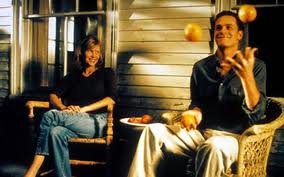
This movie is based on a German fantasy novel first published in 1979. The English translation was published in 1983 and adapted into several films. The most popular is the WB 1984 version, which I must have watched a hundred times as a kid. As I am covering movies from my childhood this month, I've watched it again.
I really related to Bastian, who would rather spend his time reading and daydreaming than in school. I wish that I'd had access to a sweet, creepy attic when I was his age. I was watching this with my 2 youngest siblings, who aren't as familiar with this odd tale as I am, and from the moment the racing snail rose his strange head, there was a constant flow of "What the heck?" from both of them. The characters in this movie are definitely strange, but they all have one thing in common: their world, Fantasia, is being destroyed by the "Nothing." They seek the help of the Empress, who lives the heart of Fantasia in a beautiful castle called "The Ivory Tower."
However when they arrive, they discover that she is deathly ill,
and that their only hope is a young boy named Atreyu (who is
apparently green in the book). His only guidance, that he "must
go alone, leave all his weapons, and it's very dangerous." He accepts the challenge and begins his quest, but so does the "creature of darkness," Gmork, who seeks to kill him.

I was terrified of this thing as a kid, and not just because I had a huge crush on Atreyu and couldn't bare the thought of that beautiful face of his getting chewed off. (He's even cuter now.) He travels into the "Deadly Swamps of Sadness" to find
Morla- the Ancient One. Without a doubt

this is the saddest part of the movie. Whoever lets the sadness overtake them sinks into the swamp, and for some reason Atreyu's horse, Artax is very sad. Despite Atreyu's best effort (and some wonderful acting), Artax sinks into the swamp.
This is a great analogy for life- we can't let sadness weigh us down and make us "stuck." We have to care, we have to try. When Atreyu finds Morla, he is extremely confused and frustrated by how apathetic she is. The world is being destroyed and she couldn't care less. It seems that apathy and sadness can go hand in hand.
"We don't even care whether or not we care," she says.
Atreyu. goes. off. Finally Morla tells him that he can ask the Southern Oracle, but she is 10,000 miles away and he should just give up. This made me think of a talk that my almost-brother-in-law gave in church about the importance of being a "Finisher." It's one thing to begin a quest, it's quite another to finish. Luckily for the people of Fantasia, Atreyu is a finisher.

"No," says Bastian, as he notices that school is ending and he is tempted to go home, "Atreyu wouldn't quit now." And so he stays to read the book as darkness and a terrible storm approach.
Atreyu is almost lost to the swamp and killed by Gmork, but at the last moment, a luck dragon named Falkor swoops down and rescues him. Falkor (who somehow manages to be sweet and creepy at the same time) gives him a ride to the Southern Oracle, but getting there is only half the battle.

The first gate is the Sphinxes- whose eyes remain shut until someone who doesn't know their own worth tries to pass through. Despite fancy armor, their eyes can see straight into your heart and see what you really think of yourself. And if you don't realize your own worth, they blow you up, which seems a little extreme. I'm pretty sure most of us have moments where we'd get blown up for sure, where we have little or no self worth and can't see the amazing person we are and the potential we contain. Even Atreyu narrowly escapes this challenge.
The second gate is the Magic Mirror Gate- where you must face your true self. Apparently this causes many men to run screaming, but it doesn't prove to be so challenging for Atreyu, who only sees Bastian and is really confused. The traumatized one here is Bastian, who can't believe that people in a book can be aware of him. He throws the book dramatically and says "Now, this is going too far," but he eventually musters the courage to keep reading.
Atreyu goes on to discover the cure for the Empress is a new name and learns he must go beyond the boundaries of Fantasia, but in a horrible storm he loses the necklace that's been protecting him and his luck dragon. He has another run-in with Gmork, who informs him that Fantasia has no boundaries, because it represents the dreams and hopes of mankind. The nothing, conversely, is the emptiness and despair that remains when people abandon their dreams and lose their hope. Gmork is helping the Nothing because,
"People who have no hopes are easier to control. And whoever has the control has the power." This is just how Satan works. He wants us to strip us of our dreams and hopes so that we may be filled with emptiness and despair, and are easier for him to control. We have to hold tightly to our dreams and hopes so that we can resist him.
In the end, Bastian overcomes his doubt and fear and becomes a part of the Neverending Story, saving Fantasia. It's kind of ironic, because at the very beginning of the movie, his father is having a serious discussion with him about being responsible and growing up, giving up his daydreaming. And then his experience reading "The Neverending Story" only makes him believe in the world of fantasy even more.



























